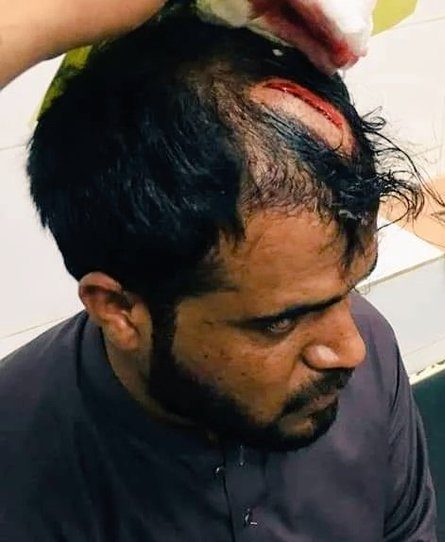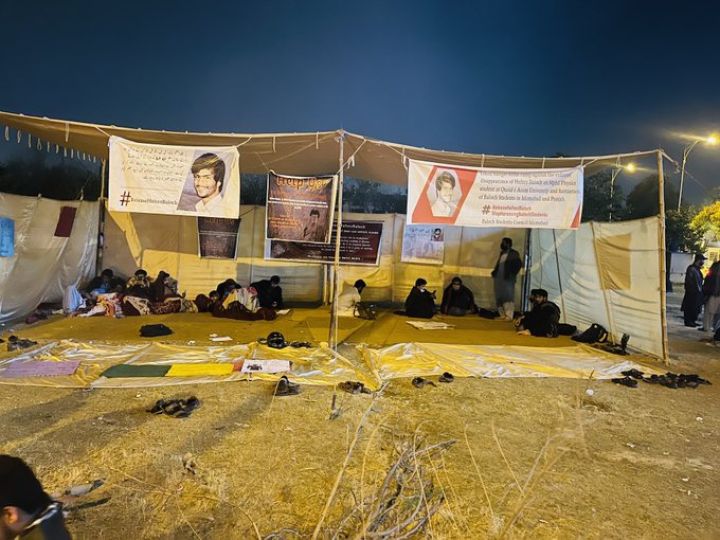Ms. Janjua’s husband was forcibly abducted by the Pakistani military 20 years ago, but the military has been denying it. Although there is evidence that he was in the custody of the military, Pakistan’s legal system could not bring the culprits to justice. The struggle for justice and freedom in Balochistan – and elsewhere in Pakistan.
Arif Jamal
Only the state repression in Khyber-Pakhtunkhwa can match the state repression in Pakistani part of Balochistan. Many Punjabi-Pakistanis learn of repression perpetuated by the Pakistani military in the smaller provinces only when they come to cities like Islamabad and Lahore to raise their voices. Unfortunately, this is very rare. When scores of Baloch students and their supporters gathered in Islamabad on March 1 to protest the enforced adductions of Baloch students Hafeez Baloch and Dileep Baloch by the Pakistani military, the police outnumbered them.  The Baloch students and their local supporters had planned a peaceful protest and a sit-in camp near Islamabad’s National Press Club. But that was not acceptable to the repressive regime we have in Islamabad. Islamabad’s police led a brutal attack on the peaceful students to disperse them. They confiscated their tents to stop them from setting up the sit-in camp and snatched their cellphones possibly to extract information about them. The police did not spare even Imaan Mazari-Hazir — a human rights attorney – who had come there to show solidarity with the protesting students.
The Baloch students and their local supporters had planned a peaceful protest and a sit-in camp near Islamabad’s National Press Club. But that was not acceptable to the repressive regime we have in Islamabad. Islamabad’s police led a brutal attack on the peaceful students to disperse them. They confiscated their tents to stop them from setting up the sit-in camp and snatched their cellphones possibly to extract information about them. The police did not spare even Imaan Mazari-Hazir — a human rights attorney – who had come there to show solidarity with the protesting students.
Hafeez Baloch is a student of MPhil at the Quaid-i-Azam University and Dileep Baloch a student of Islamia University Bahawalpur. The Baloch Students Council (BSC) Islamabad alleges that Hafeez Baloch had been receiving threats from a Pakistan Army officer who identified himself as Major “Murtaza.” Hafeez Baloch was abducted by the Pakistani military in front of many eyewitnesses when he was teaching the kids of his hometown in a private school in Khuzdar on February 8, 2022. Dileep Baloch was abducted from a military check post in Barkhan District in Balochistan on February 26, 2022.
In recent months, there have been reports that Pakistani military has been profiling Baloch and Pashtun students studying in Punjab and Islamabad. They call these students and check their smart phones and computers. Their activities on the social media are continuously monitored. When they are called for admission tests and interviews, they are asked questions which are not related to their academic achievements. Baloch and Pashtun students have reported that they were asked whether they were members of any terrorist group. The Punjabi students would not be asked such question although Punjab is the epicenter of Islamic terrorism. The Baloch Students Council Islamabad has also alleged that Major “Murtaza” had been profiling Baloch students in the Quaid-i-Azam University in the name of conducting research.
Pakistan has become a human rights black hole. It is perhaps the only country in the world where its military is implicated in thousands of illegal enforced abductions. The victims of the Pakistani military’s enforced abductions are mostly non-Punjabi Pakistanis who demand their human and constitutional rights. What happened in Islamabad on March 1 is not even the proverbial tip of the iceberg. Many of these innocent citizens are tortured to death in illegal confinement while others lose their mental equilibrium because of severe torture and solitary confinement. It may just be a coincidence that reports on the social media started speaking of the release of Dileep Baloch as the Baloch Student Council prepared to set up a protest camp in front of the Islamabad Press Club. Many see it the result of the protest. For this reason, the Baloch should bring their struggle for freedom and human rights to the streets of Islamabad and Lahore where the national media cannot completely ignore them.
It is a shame that the political parties completely ignored the protest. Mohsin Dawar was perhaps the only politician/lawmaker who came up to the protesting students to show solidarity. Human rights attorney Imaan Mazari-Hazir also joined the protest and got beaten up by the police. Human rights activist Amina Masood Janjua was also there to support their cause. Ms. Janjua has been fighting for the release of — and justice for — the victims of enforced abductions for more than two decades. Ms. Janjua’s husband was forcibly abducted by the Pakistani military 20 years ago without any charge, but the military has been denying it. Although there is evidence that he was in the custody of the military, Pakistan’s legal system could not bring the culprits to justice. The struggle for justice and freedom in Balochistan – and elsewhere in Pakistan – has yet to succeed but such people are a ray of hope in total darkness. Follow us on Twitter @AlterVoices



